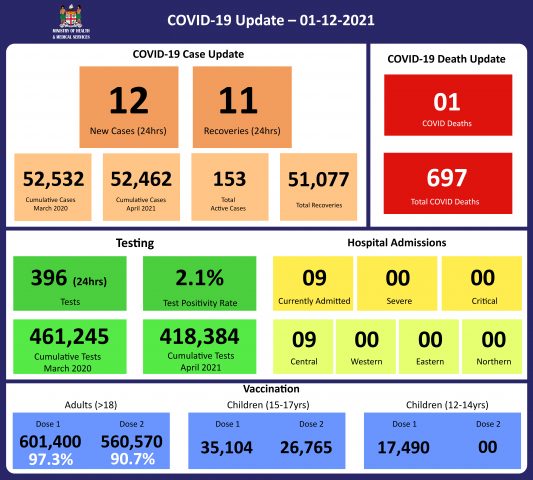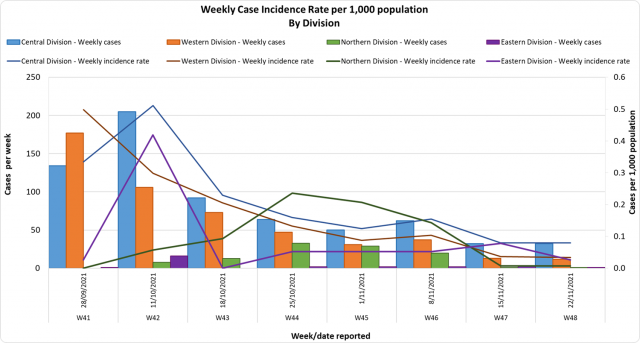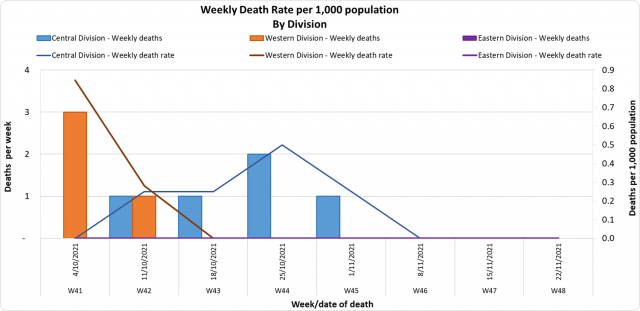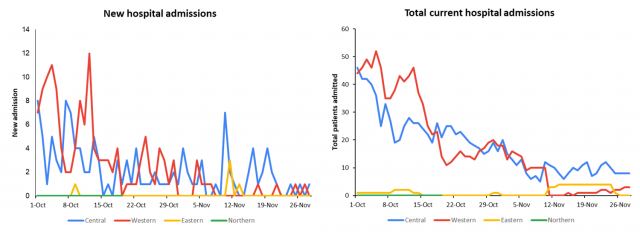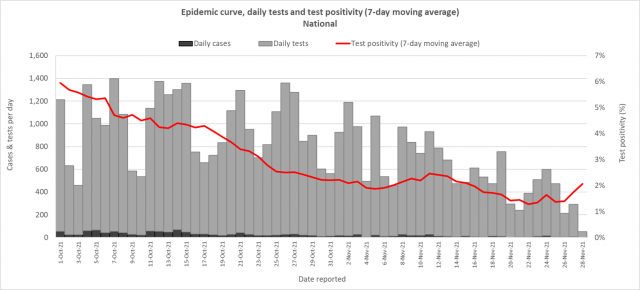COVID-19 Update – 01-12-2021
| Transmission Update:
In the past 7 days, 19 cases were recorded in the Central division, 5 new cases in the Western division, 1 new case in the Eastern Division, and 1 new case in the Northern Division. The Central Division cases constitute 71% of the cumulative total cases nationally, with the Western division making up 28% and 1% in the Northern and Eastern Divisions. Since the last update, we have recorded 14 new cases of which nil new cases were recorded on 30/11/2021 and 12 new cases in the last 24 hours ending at 8 am this morning. The national 7-day rolling average of cases as of 27th November is 7 daily cases. The weekly incidence rate graph by division indicates a continually declining trend. Furthermore, the peak weekly incidence in the western division was approximately a third of that in the central division, and the cumulative case numbers are also reflecting a similar difference. |
| Deaths:
This curve depicts the weekly death rate per 1000 population by divisions since October 2021. Overall, the death rate graphs for the Central and Western Divisions indicate a declining trend. The differences between the Central and Western are similar to the incidence of the weekly cases and are likely a reflection of vaccination levels, COVID mitigation measures, and differences in population density. There is one COVID-19 death to report. The COVID-19 death to report is of a 67-year-old female from the Central Division who died at home on 13/08/2021. She was not vaccinated. This is reported today due to a delay in the issuance of the death certificate. There have been 697 deaths due to COVID-19 in Fiji, with 695 of these deaths during the outbreak that started in April this year. Please note that due to the time required by clinical teams to investigate, classify and report deaths, a 4-day interval is given to calculate the 7 days rolling average of deaths, based on the date of death, to help ensure the data collected is complete before the average is reported. Therefore, as of November 27th, the national 7 days rolling average for COVID-19 deaths per day is 0.0, with a case fatality rate of 1.32%. We have recorded 605 COVID-19 positive patients who died from serious medical conditions they had before they contracted COVID-19; these are not classified as COVID-19 deaths. |
| Hospitalisation:
The downward trend in both the new hospital admissions and total admissions in all hospitals admitting COVID-19 patients across the country is consistent with the cases and death trends. The hospital admissions continue on a downward trend indicating a sustained positive response to COVID mitigation measures, Population density differences, and differential Vaccination rates. |
| Testing:
344 tests have been reported for November 23rd, 2021. The 7-day daily test average is 395 tests per day or 0.4 tests per 1,000 population. The national 7-day average daily test positivity is 2%, which is below the WHO recommendation of 5%, and this is illustrated by the lab testing graph. Though we continue testing in high-risk areas, our case numbers and test positivity rate indicate a better control of the community transmission in Fiji through the combined efforts of containment and mitigation measures with ongoing community surveillance. |
Epidemic Outlook:
The Ministry of Health continues to monitor the outbreak using indicators such as daily case numbers, hospitalizations, test positivity, and deaths.
Occupancy rates in health facilities, the occupancy rate of ICU beds, death rates, and vaccination coverage are indicators to monitor our health response capacity and we see a decreasing trend across indicators from our health facilities with increasing vaccination coverage for adults and 15-17-year-olds in Fiji. With the commencement of vaccination for 12-14-year-olds, we expect their coverage to contribute to reducing the risk of severe disease, hospitalization, and death.
With borders opening today, we anticipate our testing numbers to increase from international repatriates and travelers including Fijians visiting families and friends. With increasing COVID-19 cases in the European region, and the emergence of the new variant of concern; B.1.1.529, named Omicron, noted to have several mutations, is a cause for concern. Our border health measures and surveillance will need to be strengthened and maintained.
Our weekly testing numbers of over 4,000 are still above the WHO recommended rate of 4 tests per 1,000 population per week (or approx. 3,500 tests per week) and we anticipate continued surveillance and testing in our communities and maritime islands to monitor and detect cases for early intervention.
Public Advisory:
Opening Borders and Variants
Today Fiji opened our international air travel borders to fully vaccinated COVID-tested travelers.
The reports about the new variant continue with new evidence that OMICRON had already achieved global spread well before it was reported by South African scientists, establishing itself in some European countries. These are countries that have the ability to check for the variant while other countries do not have genetic sequencing and cannot confirm cases of the variant at this time.
In Fiji, we currently have COVID-positive travelers in quarantine who arrived in the country from African states before we knew about OMICRON. They have been quarantined in line with the stringent measures we apply to countries we consider a red zone for ongoing viral spread. Their specimens will be forwarded this week overseas for genetic sequencing.
If transmissible enough, stringent border and community measures will only delay the inevitable entry and spread of current and future variants of the COVID 19 Virus. Fiji citizens will only be safe if we remain COVID safe with 2-meter physical distancing; mask wisely by carrying a mask when you are out of your home and wear the mask properly in public indoor spaces, public service vehicles, and outdoor crowded spaces; open windows to improve ventilation; avoid poorly ventilated or crowded spaces; keep hands clean; cough or sneeze into a bent elbow or tissue; and get vaccinated when it’s your turn. This message is more important than all the stringent public health community and border measures.
The Ministry of Health and Medical Services is continuing to improve public health and medical capacities to manage an increase in cases. As such the remodeling of the health service provision will continue its current focus on:
- Community surveillance through test trace and track protocols is being escalated to help us identify and contain any outbreak early.
- Registration and line listing of vulnerable persons especially in poorly vaccinated areas has been done;
- Preparations for the monitoring of positive cases and vulnerable persons to ensure better access to appropriate care plans has been made;
- Clinical care protocols for the severe disease has been reviewed and strengthened;
Supporting School Re-opening
As international travel starts we also need to start looking at schools opening. While COVID-19 poses a lower risk to children we know that secondary transmission from young school-age children can and does occur in both household and school settings. The Ministry of Health and Medical Services is concerned about the adverse impact that school closure is causing to the mental and physical health of our children, and also to our medical programs in schools. Whilst our vaccination program of children is ongoing, it is important that we appreciate that all our community-based COVID safe measures are the key to ensuring the safe return of our children to school. In much the same way that we need to be COVID safe to help keep our borders open we also need to be COVID safe to help open our schools and keep them open.
Community Engagement and Community Based Surveillance Training
The risk communications and community engagement team under the COVID-19 Incident Management Unit is currently rolling out community engagement training with community health workers, turaga-ni-koro, mata-ni-tikina, church leaders, school managers, headteachers, and principals in rural areas throughout Fiji. The outcome of this training is COVID-19 preparedness, equipping local communities with the knowledge to carry out community-based surveillance, care pathways for COVID-19 cases and COVID-19 safe measures as the country opens its international and national borders and families reunite for the festive season across the country. We are mindful of the rainy season and the threat of cyclones. Furthermore, we usually expect cases of Leptospirosis, Typhoid, Dysentery, and Flu during this time.
Using COVID-19 surveillance guidelines developed by the Fiji CDC, the community engagement roll-out provides guidance for local community leaders to recognize and identify COVID-19 and other infectious diseases, signs, and symptoms and ensure the health and medical authorities are informed in a timely manner and able to respond appropriately cases that may develop in the community.
A key message we want participants to promote is that family and community gatherings may result in a laxity of COVID-19 measures and that it is their duty as community leaders to ensure that all members of the community understand the reasons behind the COVID-19 safe measures and that each and every person plays their part in keeping their families and communities safe. It is important that COVID-19 preparedness is incorporated into the community action plans that address village development including disaster preparedness. The community engagement is rolled out with support from the Ministry of iTaukei Affairs for the participation of the Roko Tui, the Assistant Roko Tui’s and the Turaga ni Koro and the Ministry of Rural and Maritime Development through the Commissioner’s Office for the participation of the District Officer and District Advisory Councilors.
Last Updated on 3 years by Publishing Team

